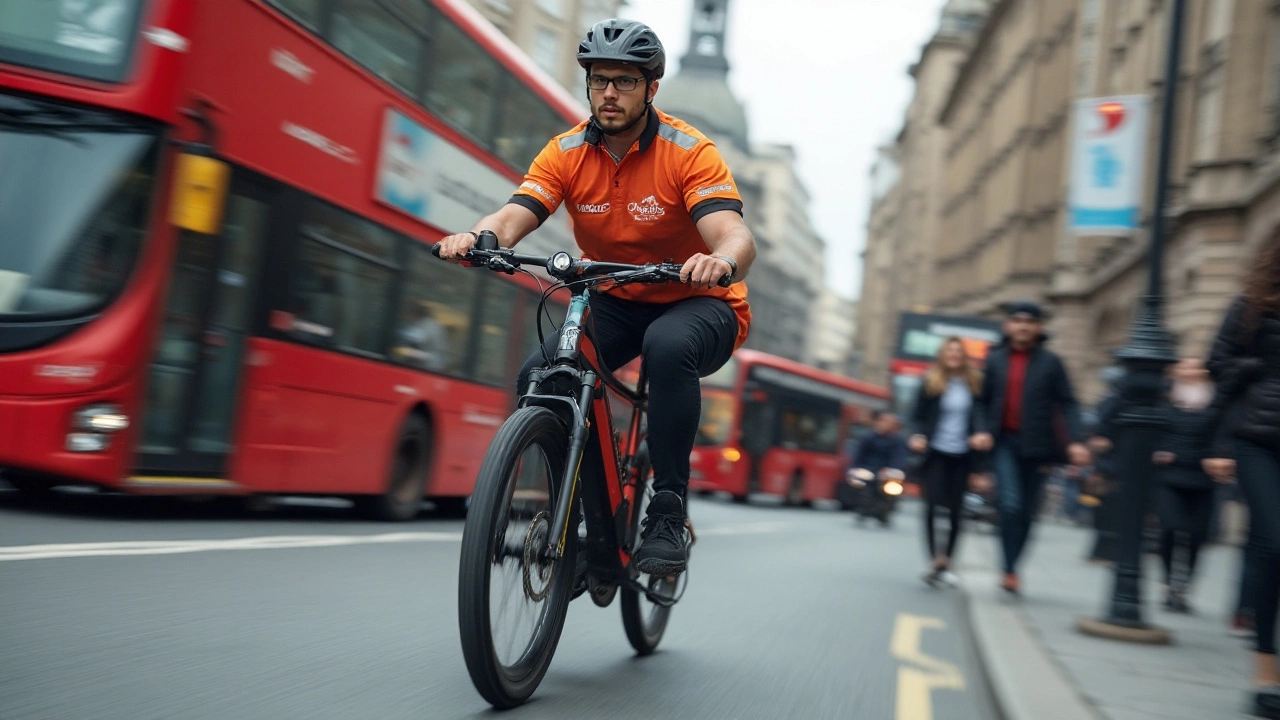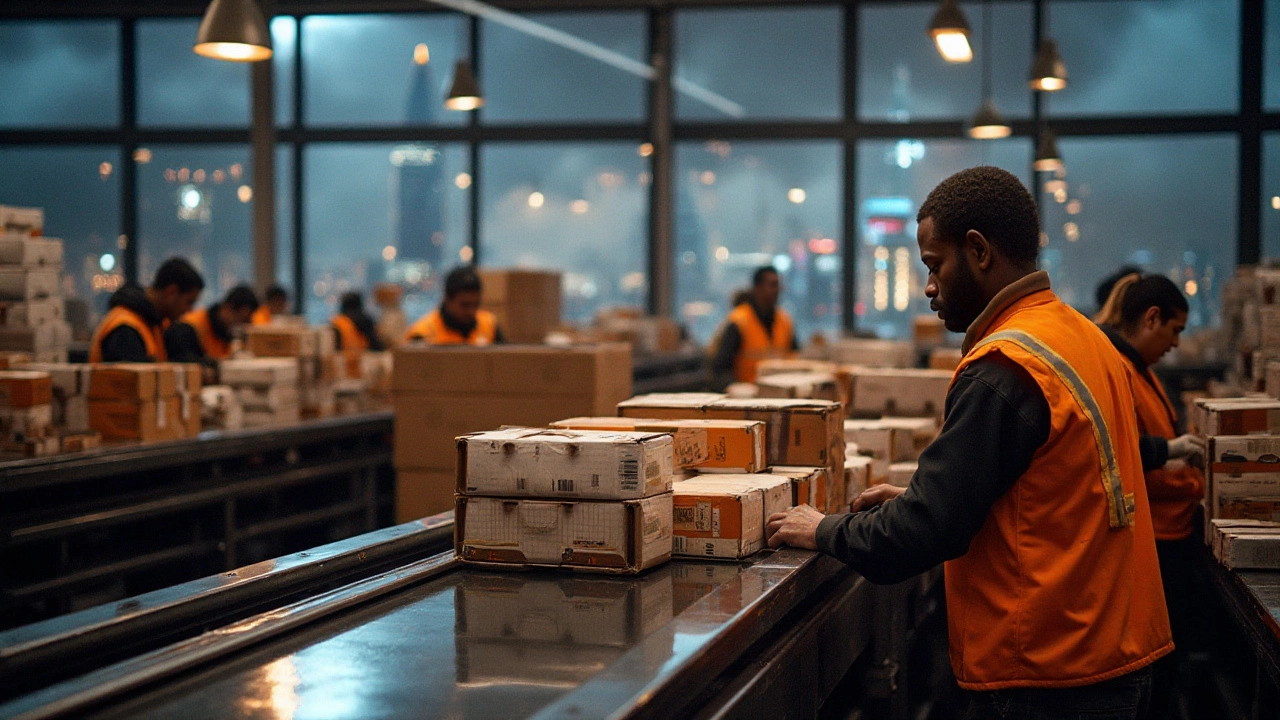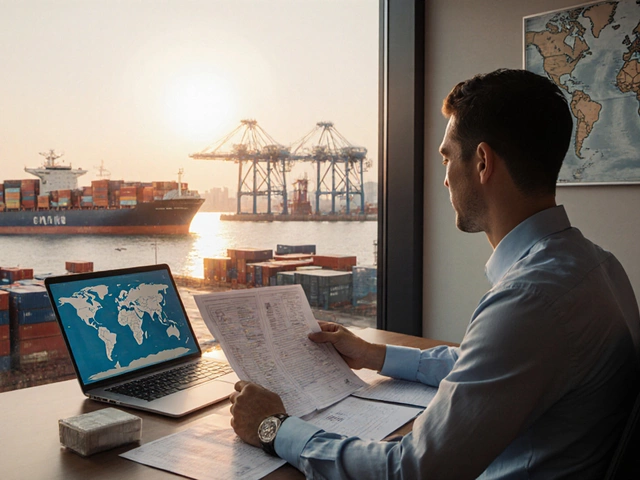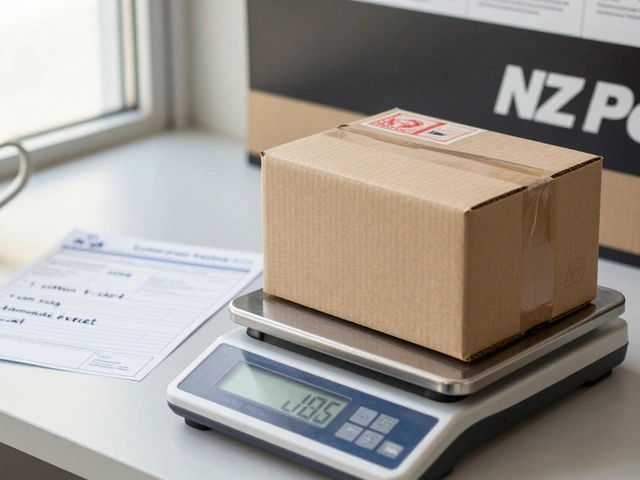In the realm of delivery and logistics, courier services stand out as an essential component. Whether you're a business needing to send products to customers or an individual shipping a gift to a loved one, these services provide the flexibility and reliability required for modern transactions.
Unlike traditional mail, couriers offer not only speed but also a guarantee of safety and tracking. This can range from same-day delivery within cities to international shipping that spans continents. As technology evolves, so do the methods and efficiency of these services, making them indispensable in our connected world.
- Understanding Courier Services
- Types of Courier Services
- Benefits of Using Courier Services
- Technological Advancements in Courier Services
- Selecting the Right Courier Service
- Future Trends in Courier Services
Understanding Courier Services
The world of courier services is as vast as it is fascinating. These services are much more than just the simple act of transporting packages. At their core, they offer a specialized method of delivery designed to meet the varying needs of both companies and individuals. In essence, they strive to ensure that parcels reach their intended destinations quickly, efficiently, and securely, which is a feat that traditional mail systems struggle to match in terms of speed and reliability.
Delving deeper, one finds that courier services can vary greatly depending on the specific nature of the contract, the locales involved, and the types of goods being transported. For instance, businesses often rely on couriers for expedited shipping solutions that are tailored to handle urgent documents or time-sensitive products. This is where the concept of acceleration becomes significant, as couriers provide same-day, overnight, or scheduled delivery options that cater to these demands. Individuals might enlist couriers for personal transfers, such as sending a birthday gift across the country, ensuring that special touch is not lost during the journey.
An interesting aspect of modern courier services is their integration of advanced tracking systems. Gone are the days when senders and recipients were left guessing the whereabouts of their packages. Through state-of-the-art technology, real-time tracking becomes possible, allowing transparency and peace of mind for everyone involved. Many couriers now provide these tracking capabilities as standard, which profoundly enhances the user experience.
Historical Evolution and Innovation
Courier services as we know them have come a long way from their origins, evolving from ancient messengers who carried correspondence on foot or horseback across empires. Today, courier companies are sophisticated operations that leverage global networks and cutting-edge technology. This evolution has also seen the introduction of eco-friendly measures, addressing concerns about the environmental impact of constant shipping. Many couriers are now dedicating efforts towards reducing carbon emissions, utilizing electric vehicles, and optimizing delivery routes through smart logistics.
"Courier services are the silent backbone of global logistics networks, ensuring that businesses and individuals remain connected, regardless of geographical boundaries," said a representative from a leading logistics firm.
Looking closer, one may wonder how these services differentiate from traditional postal services. The answer lies in their flexibility, personalized customer service, and ability to accommodate specific client needs. Whereas a postal service might only offer broad delivery windows and limited tracking, a courier service often provides tailored solutions. This nature of customization is why they have asserted themselves as key players in the logistics space.
Types of Courier Services
Courier services can vary widely, catering to different needs and offering distinct features designed to handle various types of deliveries. One of the primary distinctions lies in the speed and scope of delivery. Same-day delivery services, for instance, have become incredibly popular, especially in urban areas where businesses and consumers alike demand immediate gratification. These services can often guarantee that your parcel arrives at its destination within hours, a promise that traditional postal services rarely provide. On the other end of the spectrum, international courier services manage the intricacies of cross-border shipping, ensuring that packages pass through customs efficiently and reach far-flung corners of the globe.
Another essential differentiation involves the size and nature of the package. Some couriers specialize in document courier services, ensuring that crucial papers reach offices and institutions without delay. These services often provide added security measures, like the ability to track the package in real-time, which is crucial for sensitive information. At the same time, other courier services are geared towards large shipments, efficiently transporting bulky and heavy goods across cities, countries, or continents. An important consideration in selecting a courier is whether they offer specialized services such as handling fragile or perishable goods, which require extra care and sometimes even refrigerated transport.
In recent years, technological advancements have ushered in a new era of technology-driven courier services. These services often integrate apps or online platforms that allow customers to book, track, and manage their deliveries with ease. Some have adopted automated systems or employed drones for delivery in remote or high-traffic areas. This digital transformation of couriers is reshaping how deliveries are managed and creating a more streamlined experience for users. As the demand for efficiency and speed continues to increase, courier services are rapidly evolving, pushing the boundaries of what's possible in the logistics sector.
"The speed at which courier services have adapted to technological and logistical demands is nothing short of remarkable. For businesses, this adaptation means not only meeting customer expectations but exceeding them." - Logistics Insider Magazine
For businesses and personal users alike, understanding these various types of courier services is vital to making informed decisions. Recognizing the specific needs for each delivery helps to determine whether you require same-day service, international shipping, or perhaps a service that specializes in handling certain types of goods. Choosing the right courier not only impacts the speed and safety of your delivery but can also significantly influence customer satisfaction and trust, making it a vital consideration in the ever-competitive world of business.

Benefits of Using Courier Services
When it comes to transport and delivery, courier services are unrivaled in their capacity to cater to both businesses and individuals seeking reliability. One of the most notable benefits is speed. With options ranging from same-day delivery to scheduled international shipments, couriers ensure your package gets to its destination when you need it there. The logistics industry thrives on efficiency, and couriers have mastered this art by establishing strategic partnerships and networks that cut delivery times significantly.
Another key advantage is the level of security provided. Couriers understand the importance of protecting valuable items, so they offer secure handling and packaging that diminishes the chance of loss or damage. A common feature is the real-time tracking that keeps both the sender and the recipient informed at every stage of the journey. This transparency not only increases trust but also allows for quick resolution of any issues that may arise during transit.
Certainly, customization is a feature that cannot be overlooked. Courier services enable businesses to enhance their customer service by offering personalized delivery options, which include specific delivery windows and signature requirements. For businesses, these options are integral in building brand loyalty and customer satisfaction, as they offer a level of flexibility that standard postal services often do not accommodate.
"The boom in e-commerce has resulted in a significant demand for innovative delivery solutions," states Jane Doe, a logistics expert and industry analyst. "Courier services have responded by tailoring their offerings to meet these evolving customer expectations, showcasing their versatility and indispensability in modern logistics."
Cost-effectiveness is another significant benefit, particularly for small businesses. While at first glance, courier services might seem pricier than traditional shipping, the value added through faster deliveries, enhanced security, and customizable services often result in expenses that are lower in the long run. This is due to a reduction in product loss, return rates, and enhanced customer satisfaction which fosters repeat business.
Access to remote areas is also a growing necessity in our interconnected world, and courier services rise to the occasion here too. They have dedicated resources for reaching locations that are typically underserved by other delivery solutions. This broadens market access for businesses aiming to reach a global audience, presenting a compelling reason to utilize courier services as a cornerstone of logistics operations.
Moreover, technology integration allows data and analytics to be gleaned from every transaction, making planning and decision-making more informed. With features such as predictive analytics available, couriers not only ensure the efficient handling of parcels but also help businesses model and forecast their shipping needs more effectively.
Technological Advancements in Courier Services
The world of courier services has undergone a dramatic transformation, led by technological innovations that have redefined delivery dynamics. At the heart of these advancements is the capacity to use technology for real-time tracking, offering customers the ability to monitor their package from dispatch to doorstep. GPS technology plays a pivotal role in this, providing precise location data that builds trust and transparency between the service provider and the consumer.
Another remarkable shift has been the integration of automated systems and AI-driven solutions. Sorting facilities now employ robots for efficient parcel handling, which drastically reduces human error and accelerates the process. Furthermore, machine learning algorithms help optimize delivery routes, factoring in traffic, weather, and delivery urgency, ensuring packages arrive on time even in bustling urban centers.
The rise of drone technology presents an exciting frontier for logistics. Drones offer a novel means to overcome geographical barriers, making same-day delivery feasible even in remote or challenging terrains. Some companies are already piloting programs to integrate drones into their delivery fleet, promising a future where air travel isn’t just for people but for packages too.
In terms of communication, the digital interface between client and courier service has seen exponential growth. Mobile apps allow seamless service requests, cancellations, and customer support, while push notifications keep users informed every step of the way. Blockchain technology is another frontier being explored, with the potential to revolutionize the way proof of delivery is handled by ensuring data integrity and security.
One fascinating area to watch is the deployment of electric and autonomous vehicles, aiming to address both efficiency and environmental concerns. These vehicles promise to reduce the carbon footprint of shipping operations, aligning courier services with global sustainability goals. The journey of technological advancement continues, constantly evolving to meet the needs of businesses and individuals in a rapidly changing digital landscape.

Selecting the Right Courier Service
Choosing the perfect courier service can feel like navigating a maze, especially with the plethora of options available today. The process requires a thoughtful consideration of several factors that could affect your delivery experience and the success of your shipment. First and foremost, it's critical to understand your specific needs, such as the type of goods being shipped, the urgency of the delivery, and the geographic location of the sender and recipient. Deciding whether you require a domestic or an international service is a starting point that can significantly narrow down your options.
A crucial aspect to consider is the reliability and reputation of the courier service. One effective approach is to examine reviews and ratings from past customers, which can provide insights into the service quality and reliability. Word of mouth from friends or colleagues can also be a powerful indicator of a courier's capabilities. Moreover, a company’s history in the industry can tell you a lot about their experience in handling logistics.
The cost of the service is another pivotal factor, but remember, price doesn’t always equate to quality. Many couriers offer competitive rates, but the cheapest option may not necessarily meet your expectations in terms of speed or package safety. It's essential to weigh the costs against the services offered, ensuring that you're getting value for your money. Be aware of hidden charges such as fuel surcharges or Saturday delivery fees that might affect your final bill.
For businesses, leveraging technology is indispensable. A courier service offering comprehensive tracking features is often preferable. The ability to monitor shipments in real-time, receive notifications, and have delivery details at your fingertips can provide significant peace of mind. This is also beneficial for individual customers who want reassurance that their delivery is on schedule. Consider if the courier provides convenient solutions and technological integration that aligns with your business processes.
"Good businesses look for seamless integrations that enhance both customer satisfaction and operational efficiency," observes logistics expert James Tan.
Another factor is the breadth of services a courier offers. Some couriers specialize in same-day delivery, which might be crucial for your needs. Others might offer logistics solutions tailored for specific industries such as pharmaceuticals or legal documents. It's beneficial to understand the scope of the courier's offerings, enabling you to choose one that aligns with your specific demands.
In this tech-driven era, customer support is increasingly pivotal. Opt for a courier service that offers robust customer support channels. Whether it's a question or a concern about a delivery, having access to quick and effective customer assistance can make a significant difference to your experience. Evaluate if they offer support through multiple channels such as live chat, email, or phone, contributing to their responsiveness and willingness to resolve issues.
The following table, derived from industry reports, highlights some notable statistics concerning customer priorities when selecting a courier service:
| Customer Priority | Percentage |
|---|---|
| Tracking Capabilities | 75% |
| Service Reliability | 69% |
| Cost | 60% |
| Customer Support | 54% |
Considering these facets carefully can guide you in identifying the right courier service that caters to your needs effectively. As you navigate through the options, keeping these pointers in mind will not only lead to a satisfactory choice but could also enhance your shipping experience, ensuring timely and secure deliveries.
Future Trends in Courier Services
As the intricate web of global connections continues to expand, courier services are entering an era defined by innovation and sustainability. The future will likely see these services adapting more swiftly to both technological and environmental challenges. A key trend is the integration of artificial intelligence and machine learning to optimize delivery routes. By analyzing vast amounts of data, AI can improve efficiency, reduce travel time, and cut emissions, providing a massive boost to both logistical accuracy and environmental consciousness. The focus will be on eco-friendly delivery options, where electric vehicles and bicycles will become common, especially in urban areas, minimizing carbon footprints.
Another anticipated shift in the courier landscape pertains to the increased use of drones for last-mile delivery. Drones can navigate traffic-choked streets and deliver packages faster than traditional methods. Though regulations and infrastructure need further development, companies are investing heavily in drone technology. With the rapid pace at which these advancements are happening, it won't be long before seeing drones buzzing over neighborhood rooftops becomes a normal sight. A trend already gaining traction is the use of smart lockers, which are secure, automated delivery points located in public or communal spaces. They not only offer customers flexibility in collection times but also reduce failed delivery attempts, providing convenience and efficiency.
The role of robotics is also worth highlighting as it becomes deeper established in warehouse operations. Robotics technology allows for accurate inventory management, faster processing times, and less manual labor, leading to significant cost savings and efficiency improvements.
"The automation of supply chains will revolutionize logistics, enabling faster and more reliable service," says John Porter, a noted logistics analyst. "Robotics is at the heart of this transformation."Changing consumer expectations are shaping how courier companies operate; there's a steady demand for real-time tracking and personalized delivery services. Modern customers want transparency about their package’s journey, and companies are using advanced tracking systems to cater to this demand, employing mobile apps and digital interfaces to provide live updates.
Lastly, partnerships between independent couriers and major corporations form another layer of the evolving picture. They allow smaller players to leverage larger logistics networks, while big companies benefit from local expertise and customer connections. Technology firms are stepping into the logistics space, offering platforms that pair senders with couriers, mirroring the gig economy model. As these changes unfold, package delivery will become more seamless, efficient, and environmentally conscious, adapting to the nuances of consumer lifestyles. The promising marriage of technology and logistics heralded by courier services assures a future that’s not only faster but also remarkably smarter.





